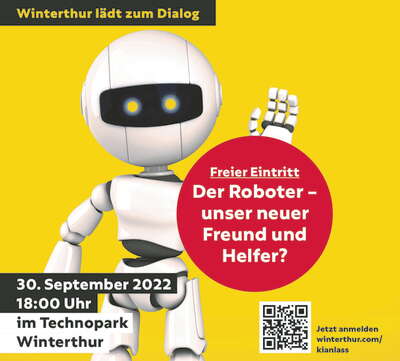"Artificial intelligence will relieve us of mindless tasks"
Artificial intelligence is already being used in many places in the world of work. But anyone who fears that robots will make many jobs redundant in the near future is mistaken. At least this is the opinion of Helga Rietz, physicist, science journalist and Head of Science Communication at the ETH AI Center. In this interview, she explains the opportunities that artificial intelligence brings and where it reaches its limits.
How do you explain what artificial intelligence is to a layperson?
Helga Rietz: According to a common definition, the term artificial intelligence, or AI for short, means that a machine does things that we humans believe require intelligence. To avoid getting philosophical, we can formulate it like this: artificial intelligence is the ability of a machine to imitate human abilities such as logical thinking, learning, planning and creativity, as well as analyzing and making decisions.

Helga Rietz is head of science communication at the ETH AI Center and previously worked for the NZZ and as a freelance journalist for Die Zeit and Deutschlandfunk, among others.
How intelligent is artificial intelligence? Where and when does it reach its limits?
Artificial intelligence fails spectacularly time and again - and not at the particularly difficult tasks, but at the ones that any toddler could do effortlessly. A constant source of entertaining AI failures are image recognition programs that sometimes cannot distinguish cookies from dogs. Automatic translators that are actually very good can sometimes turn the meaning of a sentence into its opposite. And one of the best language models currently available, GPT-3, had an amazingly prompt answer to the question "What do fried eggs eat for breakfast?": "Toast and fruit". I bet you would have had to think longer. There are plenty of examples like this; a number of scientific publications are dedicated solely to investigating such failures. They can tell us a lot about the way AI works and thus provide clues as to how it can be improved.
Where is it already being used in everyday working life, for example in the healthcare sector?
One of the very first chatbots was in some ways a medical AI application - or at least a forerunner of one: Eliza, as the program developed by Joseph Weizenbaum at MIT between 1964 and 1966 was called, simulated a psychotherapist. It worked surprisingly well: people who interacted with Eliza reported feeling safe and understood. Today, you can buy Eliza's - much more advanced - offspring as an app for your smartphone. Various programs for the early detection of chronic diseases are being tested in everyday clinical practice, for example for diabetic retinopathy, an eye disease. There are also apps for cell phones that use camera images to check whether a certain fitness exercise is being performed correctly, for example.
Which professions will benefit from AI and to what extent?
Almost every profession involves repetitive, dull or physically demanding tasks. For a doctor or nurse, this could be recording patient consultations and treatments, all the "paperwork". There are proposals here to speed up or massively simplify the completion of tasks with the help of AI, because these are precisely the things that AI is good at: Capturing, searching and organizing mountains of data. In a similar way, AI could also support lawyers, or an urban planner who needs to understand and manage urban traffic flows. And because there are such repetitive tasks in practically every profession, we can certainly expect AI tools to appear in almost every line of work in the long term.
Will AI make certain professions superfluous?
Not that quickly. Every profession has a deeply human core that cannot be automated. People will always be responsible for this. But every profession also has tedious, repetitive parts that advanced AI applications can make easier for us.
What new professions and companies might emerge?
Most of what is being created is not that new. It's more like industrialization and digitalization: parts of tasks that were previously carried out by humans with a great deal of effort are handed over to a machine, a computer or an AI. This does not mean that a profession will disappear per se. But everyday working life is changing.
How well is Switzerland, and the Winterthur and Zurich region in particular, positioned internationally in the field of AI?
The density of AI researchers, start-ups and companies in the greater Zurich area is already exceptionally high: research into artificial intelligence has been conducted at ETH for decades, and with the University Hospital and Balgrist, we have important medical technology and life sciences locations in close proximity. Large IT companies with important interfaces to AI - Google, Apple, Meta, Disney and IBM - have also been conducting research in Zurich for years. There is also a lively start-up scene, numerous ETH spin-offs and an open, innovative entrepreneurial spirit. All of this creates an ideal starting point for the interdisciplinary, collaborative further development of AI.
What are the prerequisites for an economy to be successful in this field?
An ecosystem is needed in which research, industry and politics work together in a network so that the new technologies are not only invented, but also result in sensible, intended applications. The most difficult part of this is probably regulation: what should be allowed from a new technology whose effects we cannot yet really foresee? However, the relevant players in our region are also on the ball in this regard, for example with the innovation sandbox for AI, which was launched this year by the Office of Economy and Labor of the Canton of Zurich.

On September 30, the event "The robot - our new friend and helper?" will be all about artificial intelligence. In addition to Helga Rietz, several exciting speakers will shed light on the topic from different angles.
Alongside many other exciting speakers, you will also be taking to the stage at our AI event on September 30 at the Technopark in Winterthur. What can visitors look forward to?
Varied presentations and plenty of "food for thought". You will be surprised to see how much AI research and development is already underway in the Zurich area, and afterwards you will have a better understanding of how, where and why AI can be used.
Interview: Linda Stratacò, August 2022









